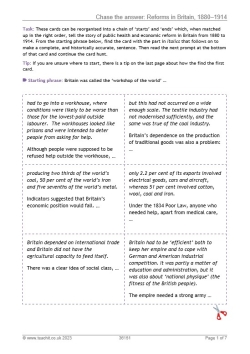Chase the answer: Reforms in Britain, 1880-1914

This 'chase the answer' activity for year 12 students is the first of two resources on reforms and transformations in Britain from 1880 to the 1920s. They can be used either separately or together.
Students link the cards into one long chain of events by reading the opening phrase at the bottom of one card and finding the card that follows on from it.
This resource has a particular focus on public health and economic reforms and covers the following:
- the state poor law system
- the role of charities and Friendly Societies
- Booth and Rowntree's surveys
- the Beveridge report
- Liberal Reforms (1906–1911), including the People's Budget Bill of 1909, the Education (Provision of Meals) Act of 1906, the Old Age Pensions Act of 1908, Labour Exchanges, and the National Insurance Act of 1911.
The second part of this resource can be found here: Chase the answer: British history, 1914–1926.
These two resources were written for year 12 students taking the WJEC A-level option on Politics, people and progress c.1880–1980, but they could also be useful for other A-level units on changes in Britain over a similar period.
An extract from the complete text:
The 1908 Old Age Pensions Act meant that people over 70 years old would receive a pension. The pension was five shillings a week for each person (approximately 25 pence). It went only to the poor.
The national system of Labour Exchanges, set up in 1909, became an efficient way for employers to find labour and workers to find jobs.
The National Insurance Act of 1911 rounded off the Liberal Reforms by introducing health insurance and employment insurance.
